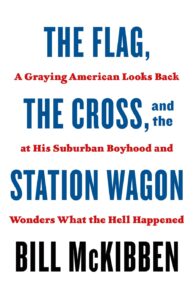 We’re glad folks appreciated the long review I did last week of Bill McKibben’s study of what has happened in recent decades in his memoir The Flag, the Cross and the Station Wagon. My couple of paragraphs before the review (and the handful of other titles I listed at the end of the column) extolled the benefit of well-written nonfiction, investigative reporting, creative looks at stuff we can learn. It is part of our calling, we think, to share with you a handful of important and impressively done books.
We’re glad folks appreciated the long review I did last week of Bill McKibben’s study of what has happened in recent decades in his memoir The Flag, the Cross and the Station Wagon. My couple of paragraphs before the review (and the handful of other titles I listed at the end of the column) extolled the benefit of well-written nonfiction, investigative reporting, creative looks at stuff we can learn. It is part of our calling, we think, to share with you a handful of important and impressively done books.
My older brother sent me a tee-shirt a few years ago that was pretty funny and I put it on to write this column. It says, “I read books and I know things — it’s what I do.” Ha. Is it what you do?
(If only we could remember all we learn in the many books we read, right?)
Delightfully written and graciously artful telling of powerful stories about stuff that matters helps us not only “know things” in the simple sense, but it changes how we view and lean into life. As one reviewer of one of the books we commend, below, put it,
“Step up into this book, which like all great books, leads us to the center of something of great importance.”
As our friend Mary McCampbell explores in Imagining Our Neighbors as Ourselves: How Art Shapes Empathy, narrative art can increase our ability to care, make us deeper, even more kind. So can other nonfiction works if they are compelling enough. As I’ve said, we can enjoy and even be entertained by a nonfiction study if it is finely rendered and a page-turner. Such even academic reading can be transforming.
I offer this column also to illustrate that we really enjoy selling these sort of books — and, I guess, just to remind you that we here at Hearts & Minds carry all sorts of titles, not just religious or theologically-oriented books. (And can can order almost anything for you.) After the last BookNotes post, I wanted to highlight a handful of other immersive, stimulating nonfiction works. We do some of the heavy lifting for you by curating a selection, and offering titles here that we think are well worth your time and hard-earned cash. We are grateful that you appreciate our efforts and take seriously our suggestions. Here are some more we recommend, in no particular order, which we’d love for you to order from us. A few are on my own “to-read” stack and I can’t wait. Let’s go learn some things!
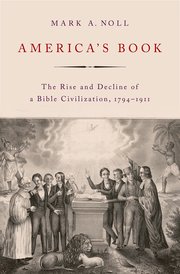 America’s Book: The Rise and Decline of a Bible Civilization 1794 – 1911 Mark A. Noll (Oxford University Press) $39.99 OUR SALE PRICE = $31.99
America’s Book: The Rise and Decline of a Bible Civilization 1794 – 1911 Mark A. Noll (Oxford University Press) $39.99 OUR SALE PRICE = $31.99
Allow me to say from the start that which most likely doesn’t need saying to our astute customers, but just in case you aren’t aware: professor Mark Noll is an esteemed emeritus history professor at The University of Notre Dame. He is a moderate in tone and social agenda, a thoughtful evangelical, and while this book is a studious exploration (almost 850 pages!) of the relationship of the Bible in early and mostly 19th century US history, it in no way would be aligned with what we call “Christian nationalists.” It isn’t even a study of that, although the question (about which Noll has spilled plenty of cautious ink) of whether the US was founded as a Christian nation looms large, then and now. Noll is impeccable and the most preeminent historian working with evangelical convictions in the religious convictions of American history. This book is not simplistic nor does its publication have anything directly to do with the modern Christian right. Just so you know.
We have long stocked most of Professor Noll’s important books, some on somewhat popular level publishing houses and those on the world’s leading academic presses (like this one.) This sweeping and epic study recounting the public role of the Bible in the US basically from the beginning of the republic through the early twentieth century is “a complex and fascinating story with measured judgement and penetrating insights” (according to George C. Rable, author of God’s Almost Chosen Peoples: A Religious History of the American Civil War.”) He claim that Noll is “attuned to ironies and silences but is also deeply respectful of the human struggle with both scriptures and culture.” It is, Rable tells us, both full of original research and an impressive project synthesizing others work.
My instinct when ordering this was that it may be what some will consider Mark Noll’s magnum opus since he has written much — often scholarly monograms, smaller hardbacks sometimes major, thick works, on everything from the role of the Bible in the earliest days of Europeans living in the so-called new world to the Founding Fathers to the theological problem and implications of the Ciivil War. I was not surprised to see an important scholar such as Candy Gunther Brown say that,
“America’s Book shines as the magnum opus of arguably the most eminent historian of American Christianity of the past century.”
Dr. Brown continues, “This magisterial volume is the authoritative study of how the Bible and American national history shaped each other. Meticulously researched, compellingly argued, and masterfully written, it belongs on every serious reader’s shelf.”
Considered a landmark volume, another critic said “reviewers will run out of superlatives.” Yet another insisted that “Everyone interested in American religion must reckon with this book.” How can we not try to promote it here and sell it to you? It’s certainly one of the most important works in this field in our lifetimes. And we have it right here in Dallastown.
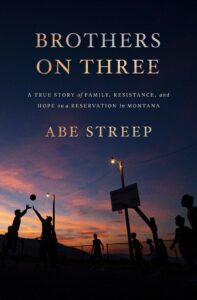 Brothers on Three: A True Story of Family, Resistance, and Hope on a Reservation in Montana Abe Streep (Celadon Books) $28.99 OUR SALE PRICE = $23.19
Brothers on Three: A True Story of Family, Resistance, and Hope on a Reservation in Montana Abe Streep (Celadon Books) $28.99 OUR SALE PRICE = $23.19
In my previous BookNotes I named Eliza Griswold as a great non-fiction writer. (I even have a blurb on the back of her Pulitzer Prize-winning Amity and Prosperity, and not a few readers have said how her Tenth Parallel changed how they viewed the geopolitics of world.) When she wrote that this Abe Streep book was “meticulously reported and exquisitely written” and a “masterwork of immersive journalism” I knew we’d want to carry it.
Another reviewer, Debra Magpie Earling (author of Parma Red), said it was a “heart-stopping, heart-stomping read.” She continues saying that it is “Unsentimental. Unforgettable. Astonishing. Brothers on Three captures the roar of a community spirit powered by blood history, loyalty, and ferocious love.”
Here again is our hero Bill McKibben, quite the journalist himself, who has come to great solidarity and friendship with indigenous peoples:
Occasionally a sports team can reflect a community in all its complexity and beauty. The Arlee Warriors played with enormous grace under pressure, and this superb book — by being honest, real, and reflective — mirrors and honors that strength. You will not soon forget it. — Bill McKibben, author of The Flag, The Cross, and the Station Wagon.
But get this — a reviewer who says better what I’ve tried to say about good nonfiction works of this sort:
Beautiful. Extraordinary. Step up into this book, which like all great books leads us to the center of something of great importance. Who deserves a place in Montana, or for that matter, a place in America? To be not just the writer who wrote this book, but the person who could write this book, and ask these questions, took a sublime amount of humility and grace. Long live Arlee, its elders and its children. They bring honor to our world. — Bob Shacochis, recipient of the National Book Award, author of Kingdoms in the Air and The Woman Who Lost Her Soul
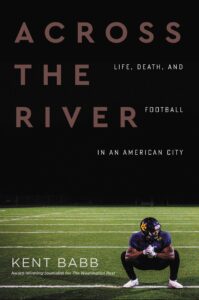 Across the River: Life, Death, and Football in an American City Kent Babb (HarperOne) $27.99 OUR SALE PRICE = $22.39
Across the River: Life, Death, and Football in an American City Kent Babb (HarperOne) $27.99 OUR SALE PRICE = $22.39
One of my wife Beth’s favorite nonfiction reads is a story set in a mill-town in Western Pennsylvania, Aliquippa, and its legendary sports teams. It is a riveting social history of mills and immigration, race and culture, economics and, yes, sports. Football, especially. Playing Through the Whistle is considered by some to be one of the great nonfiction books of recent decades and one of the great high school sports books ever.
We wondered if Across the River will become as respected, as beloved, as enduring as that and we suspect it will. It is a story about the poor New Orleans neighborhood of Algiers, set on the West bank of the Mississippi, which, as the author puts it, is “short on hope but big on dreams.” The gun violence is horrific and the Karr High School 2019 season is tense and deeply freighted. It has been called a classic of sports journalism, but obviously, is much, much more — you will learn about mentoring in tough circumstances, about urban life, about resilience. If you are like me, you may not want to read a football book in the heat of summer, but you should buy it now.
I’m not kidding about how esteemed it is. It has been called “deft” and eloquent”, “masterful” and “essential.” Check out these amazingly good blurbs:
This is the story the country needs to read–raw, expertly told, stripped of political agendas and preconceived notions. This is not a story about football, but about what football can mean. — Michael Rosenberg, senior writer, Sports Illustrated
At the Karr High School introduced to us by Kent Babb there is the expression, ‘Give Em The Real.’ This book is ‘the real.’ It’s as real as birth and death and all the heartache in between. Through Babb’s eyes, the story of Karr football is so much more than a sports book. This is the other America that too many people don’t know – or care to know – exists. — Dave Zirin, sports editor, The Nation
A literary masterpiece. Lyrically written and deeply reported, Across the River reads like a gripping, can’t-put-it-down novel. — Lars Anderson, New York Times bestselling author of The Mannings and Chasing the Bear
There is no better storyteller in the country than Kent Babb. Period. I’ve never learned more about the fabric of one of America’s greatest cities than I did in this book. — Ian Rapoport, NFL Network Insider
 Nature’s Best Hope: A New Approach That Starts in Your Yard Douglas W. Tallamy (Timber Press) $29.95 OUR SALE PRICE = $23.96
Nature’s Best Hope: A New Approach That Starts in Your Yard Douglas W. Tallamy (Timber Press) $29.95 OUR SALE PRICE = $23.96
We have number of nature books, bird books, books about trees, books about animals, books about caring for your place, like the wonderful Placemaker: Cultivating Places of Comfort, Beauty, and Peace by Christi Purifoy (not to mention her beautiful, full color hardback, Garden Maker: Growing a Life of Beauty and Wonder with Flowers.) So many lovely titles.
Nature’s Best Hope: A New Approach… is notably a handbook and practical guide for yard care but it is a real joy to peruse — the full color photos are great. A customer we respect encouraged us to promote Douglas Tallamy’s earlier Bringing Nature Home a few years ago since it is both visionary about ecological sustainability and the joy of caring for creation, but also packed with solid information and guidance for planting the right stuff.
This new one goes even further, even as it backs up and explains more of his philosophy and plan for interconnected “wildlife corridors.” Many animal species are struggling because of the disappearance of native plants. You know what comes next — the whole eco-thing gets out of whack and the demise of this creature hurts that one, which impacts another and effects us all. Tallamy’s very informative guidance in how to plant native species is fascinating and righteous. If you are worried about the planet, he says, “change starts in your backyard.” Homeowners have to take environmental action into their own hands, as he puts it, “one yard at a time.”
Richard Louv (whose books we also carry) calls the author “a quiet revolutionary and hero of our time.” Elizabeth Kolbert (author of The Sixth Extinction) says, “Tallamy lays out all you need to know to participate in one of the great conservation projects of our time.”
As one fan of the book and its ideas noted, this is “one area where individual action really can help makeup for all that government fails to do: your backyard can provide the margin to keep species alive.”
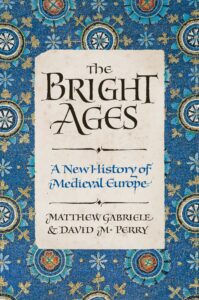 The Bright Ages: A New History of Medieval Europe Matthew Gabriele & David M Perry (Harper) $29.99 OUR SALE PRICE = $23.99
The Bright Ages: A New History of Medieval Europe Matthew Gabriele & David M Perry (Harper) $29.99 OUR SALE PRICE = $23.99
This is not the only new history of the Middle Ages, but the title may be the most clever (or in your face if you still call that era of the scholasticism of Thomas Aquinas and the legal reforms of Charlemagne “the dark ages.”) And it has been called “incandescent and intoxicating” and “lively and searing” so it’s the sort of nonfiction that we want — not dry arcane tomes.
Many people have a natural curiosity about this fascinating era — before the secular Enlightenment and the Protestant Reformation, but long past the era of the Greeks, Romans, and the early church. Whether it is a life-changing trip to the Cloisters in New York or youthful reading of the King Arthur stories or just a few too many viewing of Monty Python and the Holy Grail, this era has captured our imaginations. One of my favorite reads — not super scholarly and wonderfully written like all his “Hinges of History” series like the famous one, How the Irish Saved Civilization — is Thomas Cahill’s Mysteries of the Middle Ages: And the Beginning of the Modern World. When I saw this new Bright Ages one, I knew we had to carry it.
Considered deeply responsible, this new approach insists that the medieval world was “neither a romantic wonderland nor a deplorable dungeon.”
Matthew Gabriele is a professor of medieval studies and chair of the department of religion and culture at Virginia Tech. He is the author of the book An Empire of Memory: The Legend of Charlemagne, the Franks, and Jerusalem before the First Crusade, many articles on medieval Europe and the memory of the Middle Ages. David Perry is a journalist, medieval historian, and senior academic advisor in the history department at the University of Minnesota. He was formerly a professor of history at Dominican University. Perry is the author of Sacred Plunder: Venice and the Aftermath of the Fourth Crusade, and his writing on history, disability, politics, parenting, and other topics has appeared in the New York Times, the Washington Post, the Nation, the Atlantic… They really seem to illustrate what we’re sharing in this particular BookNotes post — top notch scholars who can write really well and draw you in to the story they are tell, the stuff they are teaching. Intoxicating!
I loved these comments from the Slate review, and then one from the Boston Globe:
While all of this is the sort of stuff that professional medievalists love to see, the thing I like most about Perry and Gabriele’s effort is that it is fun. The Bright Ages is written in such an engaging and light manner that it is easy to race through. I found myself at the end of chapters faster than I wanted to be, completely drawn in by the narrative. You can tell how much the authors love the subject matter, and that they had a great time choosing stories to share and evidence to consider. —Slate
Incandescent and ultimately intoxicating, for as the chapters progress, it dawns on the reader that those who lived in this period were more conventional than cardboard figures… They were, in essence, human. — Boston Globe
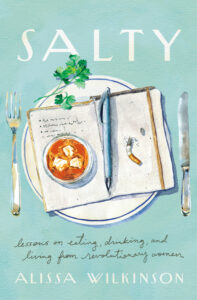 Salty: Lessons on Eating, Drinking, and Living from Revolutionary Women Alissa Wilkinson (Broadleaf Books) $25.99 OUR SALE PRICE = $20.79
Salty: Lessons on Eating, Drinking, and Living from Revolutionary Women Alissa Wilkinson (Broadleaf Books) $25.99 OUR SALE PRICE = $20.79
I was not sure I should include this terrific new book on this list of nonfiction works since Wilkinson is, I suppose, an essayist, not a journalist, and the very title of this book suggests it has “lessons.” That sort of polemical or instruction or inspirational book is standard fare for us here at BookNotes and I surely could list this along with other titles of witty self-help stuff, or even applied theology and embodied spirituality. Sure. But there is so much fascinating content here about famous (or not so famous) women – and their favorite foods and cocktail recipes – that this imagined gathering around a table with a group of extraordinary woman really does seem almost like a hilariously fun and solid documentary.
Alissa herself is a writer with a story – homeschooled in a religious home that didn’t watch TV or movies, she became a Manhattan college teacher at a Christian institution and became a somewhat controversial film critic for Christianity Today. Still a film critic and feisty writer (for Vox) Wilkinson’s project here is classic: who would you invite to a fictional dinner party. Dead or alive, who would it be?
I wonder how many other writers have attempted to write books like this that were turned down? How many were less interesting or too driven by some agenda of what you’d learn from said dinner guests? I almost cringe at the thought. But yet, it is a fun party game, isn’t it?
Alissa Wilkinson is one sharp thinker and so I want to know who she’s inviting, and why. (And, boy, was I surprised in glancing through the table of contents.) Her earlier book (written with poltical theorist and public theologian Robert Joustra on how the philosophy of Charles Taylor might give us insight into zombie movies and how that might help us be better citizens (take a breath and read that again) called How to Survive the Apocalypse: Zombies, Cylons, Faith, and Politics at the End of the World. So, yes, she is an amazingly curious person and if anybody can do a book like this, for fun and education, it is she.
I love the comments of Lauren Winner, which ring true even before I start this clever volume:
Ostensibly, this book introduces you to nine women — nine amazing women, who all have something to teach about food and about life. Here we heard Laurie Colin’s wisdom about imperfection and vulnerability (and lentils) and here we hear from May Angelous about hope and truth (and hot dogs.) But, it is Alissa Wilkinson herself — the host of this dinner party and the author of this book — who turns out to be the most vivacious presence, It’s not nine companions this book offers; crucially, it offers ten.
 Under the Skin: The Hidden Toll of Racism on American Lives And On the Health of Our Nation Linda Villarosa (Doubleday) $30.00 OUR SALE PRICE = $24.00
Under the Skin: The Hidden Toll of Racism on American Lives And On the Health of Our Nation Linda Villarosa (Doubleday) $30.00 OUR SALE PRICE = $24.00
When I saw this described in an advanced review source I knew it sounded important. The more we heard about it, the more important it seemed. Novelist Jacqueline Woodson said it is “groundbreaking, as brilliant as it is timely.” One prominent reviewer called it “brilliant, illuminating.” The New York Times Book Review called it “singular, expansive, eminently admirable.”
We wanted to stock it in our medical ethics area for local docs and health care providers to spot and also in our large section about racism. It’s just that important. It belongs on this list in this BookNotes column because it is not only vital stuff we need to learn, but, by all accounts, it is a rip-roaring read, a page-turner. It is empathetic, full of stories, sharp-sighted journalism and, powerfully, some of her own story. I have pondered the art on the cover, even, even though I”m not drawn to it.
I’ll let the blurbs on the back of Under the Skin explain why we are eager to recommend it.
Linda Villarosa, one of our fiercest and most cutting-edge journalists, has given us a classic for the ages. Through engrossing stories of people’s real experiences and her signature rigorous reporting, she reveals the biggest picture in American life–that racism has done us all in, and produced a nation so steeped in white supremacy mythology that we cannot take care of ourselves or each other. This book is a gift, a map and a necessity, relevant for every reader who wants to understand their own time. — Sarah Schulman, author of Let the Record Show
It’s no secret that Black people are subject to the cumulative effects of systemic racism. But Linda Villarosa’s Under the Skin walks us through the inevitable consequences of living in a racist country on our bodies, our environments, and our healthcare system. The cultural manifestations of the physical and psychological traumas affecting Black People alter or distort all our lives. Those of us who understand that structural violence has physical ramifications will be in debt to Under the Skin. I am grateful for the arrival of this book. It is a relief to have the truth of racialized trauma exposed in such cogent, undeniable writing and with such genius analysis. This is journalism at its finest. If you read one book this year, let it be this one. — Claudia Rankine, author of Citizen
In Under the Skin, Linda Villarosa has written a book that will transform how you understand the relationship between race and medicine, one that makes clear the connection between our history and our health. This is a book filled with indispensable research, but also filled with humanity. Villarosa tells us important stories, and also becomes part of the story herself. I’m so glad this book exists, I will be thinking about it for a long time. — Clint Smith, author of How the Word Is Passed
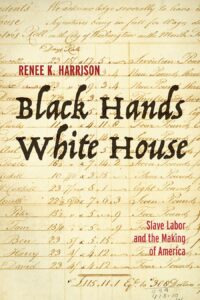 Black Hands White House: Slave Labor and the Making of America Renee K. Harrison (Fortress Press) $28.00 OUR SALE PRICE = $22.40
Black Hands White House: Slave Labor and the Making of America Renee K. Harrison (Fortress Press) $28.00 OUR SALE PRICE = $22.40
I promised that this list will suggest only the most interesting, well-written, illuminating works of serious nonfiction. I have not spent as much time with this as I need to, but I will say that it is heavy, if not daunting. At 375 pages it is a hefty (and well made) volume. As Fortress likes to say, it is “scholarship that matters.” Indeed.
One can only take so much horrible data but the facts in Black Hands White House are urgent to know and, in Renee Harrison’s good hands, the story is told with care and insight. Georgetown University historian Terrence Johnson said she writes with “clarity, precision, and agility.” And, yes, there is stuff about a “hermeneutical shift in the nation’s origin story” so it isn’t simplistic or simple. Still, it offers the sort of research that Bill McKibben’s The Flag, The Cross, and the Station Wagon implores us to explore. It is a major academic work — how long did it take her to learn all this? — so many of our most meaningful public and civic spaces were built from “the stolen days, and cemented by the stolen sweat, of enslaved African Americans.” It explores the building of the White House and the Capitol building as well as Jefferson Monticello and Washington’s Mount Vernon and other federal sites and memorials.
As Edward Baptist (of Cornell University and author of the seminal The Half Has Never Been Told: Slavery and the Making of American Capitalism) says, “Harrison shows us that the presence of enslaved labor at the heart of the United States tells us truths that we must confront with honesty, and with the commitment to repair.
Part of the repair she calls for is a specific proposal for some national monument on the National Mall about this. As the publisher explains, “Given the enslaved community’s contribution to the US, this work questions the absence of memorials on the National Mall that honor enslaved, Black-bodied people. Harrison argues that such monuments are necessary to redress the nation’s role in forced migration, violent subjugation, and free labor. The erection of monuments commissioned by the US government would publicly demonstrate the government’s admission of the US’s historical role in slavery and human-harm.
Dr. Harrison, who is a professor of US religious history at Howard University, opens the book with a story of a “walkabout” as she calls it. What a good story comes from it!
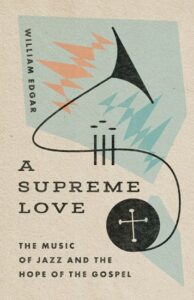 A Supreme Love: The Music of Jazz and the Hope of the Gospel William Edgar (IVP) $24.00 OUR SALE PRICE = $19.20
A Supreme Love: The Music of Jazz and the Hope of the Gospel William Edgar (IVP) $24.00 OUR SALE PRICE = $19.20
I hesitated to list this one here for one main reason: it arrived a few hours ago and I haven’t had a chance to look at it for more than a few minutes. But, believe me, I’m excited. Even if you don’t listen a lot to the classic sounds of Miles Davis, Duke Ellington, John Coltrane, Ella Fitzgerald, or Louis Armstrong — let alone modern jazz — this book is going to be a thrill and an education.
I don’t want to give the impression that, like some titles here, it is a scholarly tome. It isn’t on the IVP Academic imprint and is written for a general audience, by a music historian, theologian, popular culture scholar, and — yes! — a real jazzman. Professor Edgar has played piano in a jazz ensemble for years, and has from time to time done a stunning show which incorporates classic black music — old blues, early jazz and ragtime, and gospel — even as he lectures on the topics that finally have now made their way into a book. We’ve been waiting for years for this great contribution to the ongoing conversation about faith and culture.
Bill knows more about black music history than most and has pieced it together within a thoughtful Christian framework more wisely and astutely than anyone. As many have noted, he knows it because he has studied it as a scholar, he’s lived it — and the gospel of racial reconciliation — as a follower of Christ, and he’s lived it, man, as a real jazz player, hot musician, an artist. He gets it.
This marevlous book will need to be more carefully reviewed. For now, be the first in your circles to learn this stuff — we have it at 20% off, too. Oh yeah!
Here are three blurbs on the back from there people who, if you know anything about the serious engagement of Christian faith and the arts and music, you know this is remarkable. Wow.
In my musician mind there has always been a deep connection between jazz, musical improvisation, and the disciple life. To risk the creation of improvised music armed with only imagination and talent is to dive right in to the center of grace. It’s in the grace of God through Jesus that the musician finds peace, receives love that casts out fear, and learns to trust the reconciling power of the gospel to turn every misspent note into a glorious tool of orchestration. I simply don’t know of any contemporary who has mined this field more than Bill Edgar. With A Supreme Love, the gifted Dr. Edgar invites all readers from every vocation to experience what he’s known and taught for decades now: Jesus and jazz are inextricably linked. — Charlie Peacock, Grammy Award-winning music producer and founder of the commercial music program at Lipscomb University
For many years, Bill Edgar has been a leading figure in the music and theology world. Here he shows how deeply intertwined jazz is with the Christian gospel. But not only does he have an impressive grasp of his subject, he is a practitioner par excellence. This double qualification means that anything he writes deserves to be listened to with special care. –Jeremy Begbie, Duke University, author of Resounding Truth: Christian Wisdom in the World of Music
Jazz pianist Professor Edgar shows convincingly how jazz is rooted in the African American Black experience of daily persecuted suffering and Sunday jubilation. The biblical faith of spirituals and the psalm-like lament of blues constitute the very fiber of jazz. That is why jazz music can move from expressing deep misery to ending with sounds of inextinguishable joy. This well-written book has verve, is effortlessly informed, and offers a treasury of websites and books for anyone who wishes to understand and enjoy the gift of jazz. — Calvin Seerveld, professor emeritus of philosophical aesthetics at the Toronto Institute for Christian Studies. author of Rainbows for the Fallen World
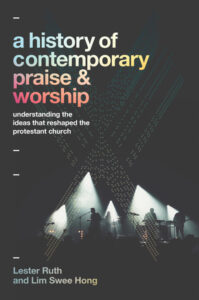 The History of Contemporary Praise and Worship: Understanding the Ideas That Reshaped the Protestant Church Lester Ruth & Lim Sweet Hong (Baker Academic) $44.99 OUR SALE PRICE = $35.99
The History of Contemporary Praise and Worship: Understanding the Ideas That Reshaped the Protestant Church Lester Ruth & Lim Sweet Hong (Baker Academic) $44.99 OUR SALE PRICE = $35.99
This was released near the end of last year and I quickly listed it as one of the Best Books of 2021. I think I’ll share bit of what I wrote then about it:
I have had a few intellectual mentors even if I suspect they’d say that wasn’t so, as I didn’t offer them the rapt attention they deserved. One was a Dutch neo-Calvinist that studied philosophy under Herman Dooyeweerd in Amsterdam; another was R.C. Sproul, then a youngish “old Princeton” Calvinist who was, to my ears, just about the smartest person I ever met. I had a college prof who was important to me — he taught geography and I was surprisingly captivated. Each of them said, emphatically, that whenever one is seriously approaching a topic it is important to study the history and development of that topic. To have true insight and a solid analysis of something going on, one must know the context, which includes the rise and influence of the ideas and forces that shaped it. We don’t sell many books on the history of this or that here at the store, but when I notice an astute one, my heart pounds a little.
My heart pounded alot when I heard about this, even more when I first saw it earlier this year — a solid, serious hardback. And then I sighed, worried that those who need this most, to understand the background and history of contemporary praise and worship as it is often understood (by those who approve and those who do not) and practice it, will be unlikely to shell out this much for a complex, if exciting, account of this topic as it developed in the past 50 some years or so.
It is simply astonishing that a book like this, rich and wise and detailed and interesting, has not yet been done. (And there are some that attempt this, or that do it in bits and pieces. These two authors, in fact, have a rough guide from about five years ago called Lovin’ on Jesus: A Concise History of Contemporary Worship that was published by Abingdon Press.)
A History of Contemporary Praise and Worship, in all 345 pages, does what no book has done and we commend it heartily. As my old influencers said, knowing the history of things that have reshaped our world, for better or for worse, is the first major step of being wise. The book is, by all accounts, the most comprehensive account yet given of the history of the development of “the liturgical forms that reshaped the landscape of Christian worship.”
The story is fascinating, starting in 1946 and quickly moving into the era 1965 – 1985. The two largest units are on “praise and worship” and “contemporary worship” and the final section explored the late 1990’s “new normal” and the confluence of the two.
Lester Ruth got his PhD from the University of Notre Dame and is now a research professor of Christian Worship at Duke Divinity School. Lim See Hong, who is native to Singapore is a Professor of Sacred Music at Emmanuel College of Victoria University at the University of Toronto.They are both astute, Godly, lively scholars and practitioners who care about the health of God’s diverse people in Christ’s diverse church.
Listen to Melanie Ross, who grew up in an evangelical church doing music ministry and now teaches liturgics at Yale Divinity School; she has written books comparing and contrasting the liturgy, music, and worship in several nondenominational/free churches and higher-liturgical congregations. She knows much about all of this and she extols the book, saying:
The story of contemporary praise & worship is fascinating and complex, and Ruth and Lim follow its twists and turns with historical precision, theological sophistication, and wondrous clarity. This book is a remarkable achievement. It will remain the standard work of reference on evangelical and Pentecostal worship for years to come.
And listen carefully to John Witvliet of the beloved Calvin Institute on Christian Worship in Grand Rapids, who is always worth listening to:
What a remarkably rich and thought-provoking account of the people and the convictions that have directly or indirectly shaped the worship practices of millions of Christians in several quite different traditions. Those who remember the people or events described here may well be astonished to see the contours of the larger story in which they played a part. This is a book that will help us slow down and listen attentively, a crucial task for anyone who is called to discern the nature of vital, faithful worship practices in the years to come, including Christians from traditions that seem at first not to be influenced by the worlds described here.
 The Plateau Maggie Paxson (Riverhead Books) $28.00 OUR SALE PRICE = $22.40
The Plateau Maggie Paxson (Riverhead Books) $28.00 OUR SALE PRICE = $22.40
This book got lost in the pandemic quarantine seasons and I am sure if we were out at events, or had browsers in our Dallastown shop, we’d have sold a few. It is beautifully written, and a compelling story, very informative and, in the words of one back cover blurb, is “exquisite, excruciating, fearless – a book not only for these times, when our need for understanding is so great, but for all times. A masterpiece.”
You see, this woman takes us on her own “wondrous, probing journey” in search of kindness and where and how it happens. (She is a professional anthropologist and knows well the vast amount of research done on war and violence and conflict; she tires of it, wondering why there isn’t more research on where and why goodness appears.) The book ends up revisiting a story and following the later generations) that was once told in Philip Hallie’s unforgettable Lest Innocent Blood Be Shed: The Story of the Village of Le Chambon and How Goodness Happened There. In that book, Hallie makes his way to Le Chambon and discovers the church pastored by Andre Trocme and his wife, and how they welcomed and protected Jews during the Nazi holocaust. How did this Reformed pastor come to teach nonviolence and resistance to evil and how did the people in this common village respond as they did, putting their own lives above others?
Maggie Paxson takes us to Le Chambon today, wondering how the grandchildren of those who resisted Hitler are faring today. The answer? Today they are offering hospitality to the influx of refugees and immigrants in Europe and, again, standing for goodness. As did their grandparents and, we find out, as did those in this French area centuries before (even resisting the Crusades!) The Plateau is a less religious story that Hallie’s was, but the legacy of the Trocme family has somehow endured. This is a book that some have said has “effected me in ways few books ever have.” Highly recommended.
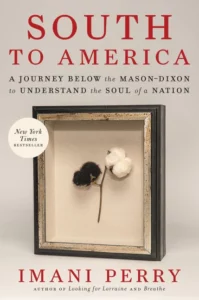 South to America: A Journey Below the Mason-Dixon to Understand the Soul of a Nation Imani Perry (Ecco Press) $28.99 OUR SALE PRICE = $23.19
South to America: A Journey Below the Mason-Dixon to Understand the Soul of a Nation Imani Perry (Ecco Press) $28.99 OUR SALE PRICE = $23.19
Like other titles on this list this is what some call narrative nonfiction, written somewhat as a memoir or autobiographical sketch, reporting and ruminating from various trips taken to the American Southland, with lots to observe, lots to learn, much to appreciate, and even more to ponder. Written by a passionate and powerful black author, we are taught much, even as she observes and teaches so much. From her explorations of West Virginia Appalachia to how the enslaved found safe haven in the Great Dismal Swamp of North Carolina (and how archeologist are still finding artifacts and tools from this generational, unnoticed community) to her curiosity about whether DC, or even Maryland, is really “the south” and then her journeys to the very deep South, we are brought along on a passionate, slow, jaunt. Her teaching about HBCU while visiting Howard is fabulous. Her writing about Annapolis is brilliant. I still have a few chapters to go — there is great depth of insight here, historical tangents, luminous prose, so I am going slowly, one chapter a night… One the face of it South to America is a really well-written travelogue; another reviewer said it is a “tour-de-force reckoning.”
For what it is worth, you will really appreciate this if you have read Lisa Sharon Harper’s important Fortune. There are even some overlaps with that narrative as Ms. Perry wonders with such longing and passion, about her old enslaved relatives from the 18th and 19th centuries.
Importantly, it seems like she is flipping the script, as they say, subverting the notion that there is just one or two primary views or archetypes of the South. It is amazing, teaching us so very, very much.
Please read and ponder these thoughtful endorsements from various reviewers:
Any attempt to classify this ambitious work, which straddles genre, kicks down the fourth wall, dances with poetry, engages with literary criticism and flits from journalism to memoir to academic writing–well, that’s a fool’s errand and only undermines this insightful, ambitious and moving project…. An essential meditation on the South, its relationship to American culture–even Americanness itself…. This work — and I use the term for both Perry’s labor and its fruit — is determined to provoke a return to the other legacy of the South, the ever-urgent struggle toward freedom. — Tayari Jones, The New York Times Book Review
Provocative, perspective-shifting…. Rendered in exquisite detail…. In this vibrant, revelatory book, Perry proves herself to be a radiant storyteller…like Zora Neale Hurston, Alice Walker, and Nina Simone before her. — Oprah Daily
Perry is deft and disciplined, her efforts to situate the beauty, oddity, and terror that mark southern life are critical and compelling. As a travel writer, she embraces detours with an eye toward discovery…. Perry asks what it means to be tied to a ‘land of big dreams and bigger lies’ when one is committed to the pursuit of a truth that bursts the nation at its seams. — Vulture
South to America marks time like Beloved did. Similarly, we will talk not solely of books about the south, but books generally as before or after South to America. I have known and loved the South for four decades and Imani Perry has shown me that there is so much more in our region’s fleshy folds to know, explore and love. It is simply the most finely crafted and rigorously conceived book about our region, and nation, I have ever read. — Kiese Laymon, author of Heavy
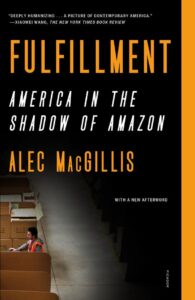 Fulfillment: America in the Shadow of Amazon Alec MacGillis (Picador) $18.00 OUR SALE PRICE = $14.40
Fulfillment: America in the Shadow of Amazon Alec MacGillis (Picador) $18.00 OUR SALE PRICE = $14.40
This is another one of these immersive journalistic stories that takes you all over the country, into the histories and backgrounds of places as different as small towns in Texas to the most posh neighborhoods of DC, from the crisp boardrooms of tech startups in the Silicon Valley to the industrial grim of hard working union guys in the huge Bethlehem Steel plant in Fells Point, outside of Baltimore (now an Amazon warehouse.) The local color is spectacularly rendered in Fulfillment and readers will be drawn into the cultures, economies, ups and downs, hopes and dreams, of various sorts of people – rich, poor, successful, forlorn, upbeat and angry – in various regions of the country. All revolve around and come back to (eventually, even if you have to hang in there a bit to see the connections, like an unfolding mystery novel or cop show) the shift to a one-click, on-line, faceless, automatized, mass market economy that has shifted the fabric of our lives and, almost always, has Jeff Bezos and Amazon at its center.
For instance, there is a fascinating section – perhaps a bit nostalgic for anyone older than 25 and certainly interesting for almost anyone who has shopped anyway other than online – about the rise of department stores and the segue to shopping centers and the eventual development of malls. (Remember malls?) MacGillis grounds his big picture analysis always in a place, and I was jumping out of my chair and yelling to Beth to “come listen to this!” when I realized he has a whole chapter about various businesses and the several malls in York, PA. He talked about our Queensgate Shopping Center, four miles from us, for crying out loud, and explored the rise of central PA shopping centers and retailers (Boscovs! The Bon Ton!) I don’t have to explain that the takeover of nearly everything by Amazon has contributed directly to the demise of real retail stores and the disruption of local economies and ruin of whole industries and locales and livelihoods. That they get gigantic tax breaks and are paid by municipalities and state and federal grants to open their grueling warehouses is well known although few crunch the numbers to show how Bezos et al our laughing their way to the banks, making a killing taxpayers expense.
MacGillis studies these things always using the structure/genre of reporting from the field, from real places. From the Latino businesses in Texas that specialize in business paper supplies to our central Pennsylvania clothing retailers to certain towns – all over – that have become shipping hubs and interstate trucking spots, to the posh Amazon lobbying offices in DC, Fulfillment offers remarkable glimpses into 21century life in these United States, in this economy, in these days. It is (as the New York Times Book Review put it) “Deeply humanizing… a picture of contemporary America.” I couldn’t put this down and it gave me many hours of fabulous reading. Highly recommended.
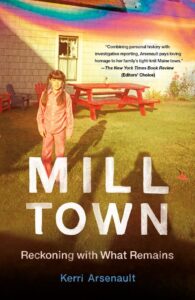 Mill Town: Reckoning with What Remains Kerri Arsenault (St. Martin’s Griffin) $17.99 OUR SALE PRICE = $14.39
Mill Town: Reckoning with What Remains Kerri Arsenault (St. Martin’s Griffin) $17.99 OUR SALE PRICE = $14.39
I admit to not realizing or thinking about how Maine is one of the primary locations for the dangerous logging industry and I admit I came to learn this when I read Dopesick, the riveting book about opioids, addiction, and the new century heroin crisis. Part of that powerful nonfiction study was made into the award-winning Netflix show by the same name. As the TV show and the book document, the Sackler company that aggressively marketed OxyContin firstly in two places where the people were often injured at work but had to keep working: coal miners in Appalachian West Virginia and loggers in Maine. And, naturally, in the nearby paper-mills.
This stunning read is called Mill Town but it is not quite like other books on steel mills and rustbelt plants and those working in the fading industrial factories. It is about a paper-mill in the working-class town of Mexico, Maine.
Mill Town is written with great affection, as the best exposes must be, and a “vividly human personal narrative uncovering a heartbreaking story that could be told in countless American towns, along countless American rivers.” There is pollution, there are cancer clusters. Some readers will wonder if there would be an Erin Brockovich type character. This reckoning is not that simple but it offers a remarkable tribute to a place that the author so loves. And we learn a lot in the meantime. This really is narrative nonfiction at its finest.
Mill Town is the book of a lifetime; a deep-drilling, quick-moving, heartbreaking story. Scathing and tender, it lifts often into poetry, but comes down hard when it must. Through it all runs the river: sluggish, ancient, dangerous, freighted with America’s sins. —Robert Macfarlane, author of Underland
Part beautiful memoir and regional history, part investigative journalism, part environmental diatribe countered by a poetic ode to place. In short, it’s a fraught love letter to that fragile American entity, the small, rural, working-class town….Arsenault’s prose shines…She has done immense and important research and delivered an engaging tale that deserves a close read.” — Stephanie Hunt, The Post and Courier (Charleston)
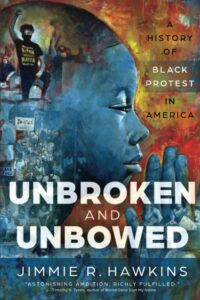 Unbroken and Unbowed: A History of Black Protest Jimmie R. Hawkins (WJK) $30.00 OUR SALE PRICE = $24.00
Unbroken and Unbowed: A History of Black Protest Jimmie R. Hawkins (WJK) $30.00 OUR SALE PRICE = $24.00
When a book is touted as having “astonishing ambition richly fulfilled” (and the person who wrote that line is the excellent writer Timothy Tyson, author of Blood Done Sign My Name) you know you have to notice. Having grown up with that black-gloved hand raised at the 68 Olympics, with the disastrous but understandable revolt inside Attica (about which there is a huge and hugely informative book called ), and having learned early on that the Black Panthers did much good in their community before their gun-toting public image distorted the nature of their primary work, I have long wanted a book about this topic, placing black protests and revolts and uprisings in a broader, organized history, and this book seems to do what no other book I know does.
From slave revolts to Jim Crow-era resistance, from CORE to SNCC to William Barber’s Poor People’s Campaign to various iterations of BLM, there is a rich and fascinating and important history of black protest.
This is the best volume on the subject, just published, written by the Director of the Office of Public Witness of the Presbyterian Church (USA.) He is ordained in the PC(USA) so we are particularly proud to recommend this seemingly comprehensive chronicle of 500 years of outrage, organizing, and bearing witness to the hope for a better world.
 What Your Food Ate: How To Heal Our Land and Reclaim Our Health David R. Mongomery & Anne Bikle (Norton) $30.00 OUR SALE PRICE = $24.00
What Your Food Ate: How To Heal Our Land and Reclaim Our Health David R. Mongomery & Anne Bikle (Norton) $30.00 OUR SALE PRICE = $24.00
There are so many books explaining the need for and showing how we can reform our agricultural systems that it is hard to keep up. There are arcane academic ones, lovely inspiring ones, some with forwards by the likes of Wendell Berry, others with endorsements by high-end restaurateurs. From wise, outspoken foodies like Alice Waters and Dan Barber to food producers like Joel Salatin or Norman Wirzba and farmer activists like Gary Paul Nabhan (Jesus for Farmers and Fishers) there is so much.
We think this brand new one should be on any good shelf of these sorts of vital books. It is, granted, mostly about the kind of soil in which our food grows, so it is, as the subtitle suggests, about the relationship of land (literally) and our health. But it isn’t just for agronomists. Paul Hawken says it is sure to become a classic and Emeran Mayer (author of The Mind Gut Connections) says it is “authoritative, informative and entertaining.” When a book can be eye-opening and called “stunningly good” we figured it’s one you should know about.
Dave Chapman, cofounder of the impressive Real Organic Project, says the old adage, “eat whole foods from healthy soil” is still essential. “This book,” he says, “gives us a riveting expose on why that is true.”
Gabe Brown, who wrote another great book we’ve carried, From Dirt to Soil, says What Your Food Ate is “a must-read for farmers, ranchers, eaters, and scientists.” Okay, then.
 The Fight to Save the Town: Reimagining Discarded America Michelle Wilde Anderson (Avid Reader Press) $30.00 OUR SALE PRICE = $24.00
The Fight to Save the Town: Reimagining Discarded America Michelle Wilde Anderson (Avid Reader Press) $30.00 OUR SALE PRICE = $24.00
This may be a bit more scholarly than some are used to when thinking about civic engagement and social concern and the common good. It is not a handbook to activism or a guide to getting involved. But yet, it repays the time taken to work through it, I am sure, with deeper sensibilities about citizenship, about localism, about lifting up what is nearly a blueprint for reform.
The author of The Fight to Save the Town is an esteemed and well loved professor at Stanford Law School. She has written widely in law journals and in the thoughtful popular press. Her area of research in this book, or at least what drew her into the topic, is how “decades of cuts to local government amid rising concentrations of poverty have wreaked havoc on communities left behind by the modern economy. Forty years after the anti-tax revolution began protecting the wealthy taxpayers and their cities, our high-poverty cities and counties have run out of services to slash, properties to see, bills to defer, and risky loans to take.”
Some discarded places, she reminds us, are rural. Others are big cities or small cities or historic suburbs. “Some vote blue, others red. Some are them are the most diverse communities in America, while others are nearly all white, all Latino, or all Black. All are routinely trashed by outsiders for their poverty and their politics. Mostly, their governments are just broke.”
This book offers a “unsparing, humanistic portrait” of the hardships left behind in four such places. But the four cities (Stockton, California, Josephine County, Oregon, Lawrence, Massachusetts, and Detroit, Michigan) are all doing things to help their places rebound. This, finally, is a story of good news, fresh thinking, positive models. Matthew Desmond (author of the extraordinary Evicted: Poverty and Profit in the American City) says of the blueprint for reform, “This book pierced means left me inspired.” Even Alec MacGillis (author of the above mentioned Fulfillment) says it is written with “empathy, analytical acuity, and highly readable prose.”
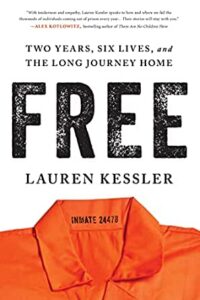 Free: Two Years, Six Lives, and The Long Journey Home Lauren Kessler (Source Books) $26.99 OUR SALE PRICE = $21.59
Free: Two Years, Six Lives, and The Long Journey Home Lauren Kessler (Source Books) $26.99 OUR SALE PRICE = $21.59
I opened this at random and started skimming a few pages and it was simply captivating. It is immersion journalism and very urgent about real lives, but it seems, then, there is an emerging pattern, a bigger picture, an insightful vision written “with clarity and heart” showing that we can work for real transformation for those who have been incarcerated and need to make a fresh start once they get out. The six lives this book tells us of just six of thousands that could be told. Anyone who knows anyone who has had a hard time with “reentry” into the mainstream culture after time incarcerated knows how very complicated and important this kind of resource could be.
Alex Kotlowitz, the respected and caring journalist who has written such poignant, powerful stuff, says it is written with “tenderness and empathy.”
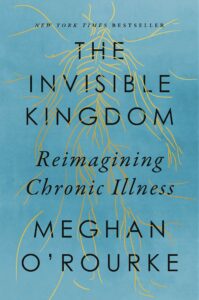 The Invisible Kingdom: Reimaging Chronic Illness Meghan O’Rourke (Riverhead Books) $28.00 OUR SALE PRICE = $22.40
The Invisible Kingdom: Reimaging Chronic Illness Meghan O’Rourke (Riverhead Books) $28.00 OUR SALE PRICE = $22.40
Since many of us know a bit about this topic of chronic pain and chronic illness (and now with long-haul Covid a reality among so many of us) we are committed to bringing important books on this topic into our store. We raved about the must-read story The Deep Places by Ross Douthat, about Lyme disease but so much more. We truly value those who tell their stories and tell them well.
The Invisible Kingdom is a book about this near silent epidemic of sufferers of a different tone and caliber. It is on the illustrious Riverhead imprint indicating, for starters, that it is serious and literary (if not exactly academic.) It is an account of her illness and is what one reviewer called a page-turner. There is beautiful writing and cutting edge science. Cathy Park Hong, author of the amazing Minor Feeling) says it is written with “poetic acuity.” Hong continues, “O’Rourke gives language to pain that eludes diagnosis. Bound to help countless patients overlooked by the medical industry, The Invisible Kingdom is also an astonishing must-read for anyone interested in how illness and suffering irrevocably change our sense of selfhood.”
Various reviewers have used superlatives, some saying that it is urgent, beautifully written, brilliant, and crucial. It is exactly this sort of serious, intelligent and important book we love to suggest for your reading.
In this elegant fusion of memoir, reporting, and cultural history, O’Rourke traces the development of modern Western medicine and takes aim at its limitations, advocating for a community-centric healthcare model that treats patients as people, not parts. At once a rigorous work of scholarship and a radical act of empathy, The Invisible Kingdom has the power to move mountains. –Esquire
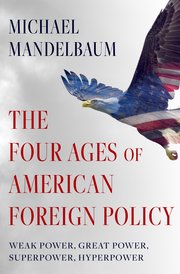 The Four Ages of American Foreign Policy: Weak Power, Great Power, Superpower, Hyperpower Michael Mandelbaum (Oxford University Press) $34.95 OUR SALE PRICE = $27.96
The Four Ages of American Foreign Policy: Weak Power, Great Power, Superpower, Hyperpower Michael Mandelbaum (Oxford University Press) $34.95 OUR SALE PRICE = $27.96
One of the interesting things about university presses like Oxford’s is that their books are first vetted with peer-reviewed to assure the reliability and academic significance of their scholarship. It is one of the reasons texts from scholarly presses are so expensive. Well, this work by this scholar would be recognized around the English speaking world and, at just over 600 pages, the book could be a lot of pricey. It is a book that surely deserves to be on any list of significant, well written, remarkable, recent nonfiction books.
Dr. Mandelbaum is a esteemed professor and scholar at Johns Hopkins and has published numerous highly regarded work. He has his distractors, of course, but even those who may not fully agree with his often provocative theses, respect him and remark on how important his books are. This one, which I’ve been eyeing up for months, now, is surely one of his most acclaimed. It has been called a sweeping masterpiece, elegant, accessible, readable. In this day and age of course it is something we must more deeply understand and grappled with. People of Christian faith will want to bring a certain sort of ethical framework to the study, of course, but this looks to be, in Susan Eisenhower’s estimation, “invaluable.”
Just listen to these impressive recommendations. Of course we want to suggest it our customers!
Michael Mandelbaum’s new book is a masterpiece. I am often asked what is the best single book to read to understand the grand sweep and history of American foreign policy, and I will now say that it is this book. Mandelbaum uniquely combines the depth and knowledge of the best historians and the breadth and imagination of the best political scientists. His organizing paradigm of the great ascent of America through its four successive ages of increasing power–coming at the end of that ascent and at the beginning of a new age of diminished power–should be fundamental and invaluable to future scholars, policy analysts, and concerned citizens. — James Kurth, Claude Smith Professor of Political Science Emeritus, Swarthmore College
The Four Ages of American Foreign Policy is a masterwork — a defining contribution to the most critical international debate of our time. It is essential for anyone concerned about world affairs. Mandelbäum’s analysis contains unique perspectives and new insights for understanding America’s role in today’s turbulent era. A profound searchlight on the past and a guidepost for the future, it combines rare scholarship with lucid relevance. Vital for both general readers and professionals. — Ralph Buultjens, Former Nehru Professor, University of Cambridge; New York University
TO PLACE AN ORDER
PLEASE READ AND THEN CLICK ON THE “ORDER HERE” LINK BELOW.
It is helpful if you would tell us how you prefer us to ship your orders. The weight and destination of your package varies but you can use this as a general guide.
There are generally two kinds of US Mail options, and, of course, UPS. If necessary, we can do overnight and other expedited methods, too. Just ask.
- United States Postal Service has the option called “Media Mail” which is cheapest but can be slow. For one typical book, usually, it’s about $3.50.
- United States Postal Service has another option called “Priority Mail” which is $8.35 if it fits in a flat rate envelope. Many children’s books and some Bibles are oversized so that might take the next size up which is $8.95. “Priority Mail” gets much more attention than does “Media Mail” and is often just a few days to anywhere in the US.
- UPS Ground is reliable but varies by weight and distance and may take longer than USPS. We’re happy to figure out your options for you once we know what you want.
– DON’T FORGET TO LET US KNOW WHAT SHIPPING METHOD YOU PREFER –
BookNotes
SPECIAL
DISCOUNT
20% OFF
ALL BOOKS MENTIONED
+++
order here
this takes you to the secure Hearts & Minds order form page
just tell us what you want to order
inquire here
if you have questions or need more information
just ask us what you want to know
Hearts & Minds 234 East Main Street Dallastown PA 17313
read@heartsandmindsbooks.com
717-246-3333
It is complicated for us, but we are still closed for in-store browsing due to our commitment to public health (not to mention the safety of our staff and customers.) The vaccination rate here in York County is sadly lower than average and the new variant is now spreading. Our store is a bit cramped without top-notch ventilation so we are trying to be wise and faithful.
Please, wherever you are, do your best to be sensitive to those who are most at risk. Many of our friends, neighbors, co-workers, congregants, and family members may need to be protected since more than half of Americans (it seems) have medical reasons to worry about longer hazards from even seemingly mild Covid infections.
We are doing our famous curb-side customer service and can show any number of items to you if you call us from our back parking lot. We are eager to serve and grateful for your patience as we all work to mitigate the pandemic.
Of course, we’re happy to ship books anywhere. Just tell us how you want them sent.
We are here 10:00 – 6:00 EST / Monday – Saturday, closed on Sunday.


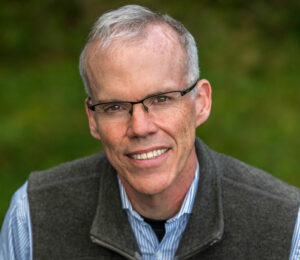 I do not know if this will be so, but Rep. Jamie Raskin has said that if we survive the “interlocking plagues of climate change, right-wing authoritarianism, and savage inequality” our future generations will – get this! – “utter the name of the New England moral visionary and activist Bill McKibben with the reverence with which we speak of Emerson, Thoreau, and Garrison.” Whew! In any case, this “graying American” looking back to figure out how the boomers and his 70s generation went astray is a great study. That it starts in his youth in Lexington, Massachusetts, is perfect.
I do not know if this will be so, but Rep. Jamie Raskin has said that if we survive the “interlocking plagues of climate change, right-wing authoritarianism, and savage inequality” our future generations will – get this! – “utter the name of the New England moral visionary and activist Bill McKibben with the reverence with which we speak of Emerson, Thoreau, and Garrison.” Whew! In any case, this “graying American” looking back to figure out how the boomers and his 70s generation went astray is a great study. That it starts in his youth in Lexington, Massachusetts, is perfect.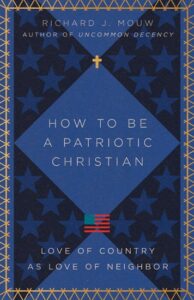 IVP on a rightly ordered love of country called How to Be a Patriotic Christian; I like and trust Rich Mouw a lot and will assume he and McKibben will have much in common in wanting to restore a glad sense of patriotism even as we know deeply the horrible aspects of our original sins. (Mouw’s subtitle is suggestive: “Love of Country as Love of Neighbor.” It is $17.00 but at our BookNotes 20% OFF sale price it’s just $13.60 — you should pre-order it now!) Look: I’m inclined to protest, or, these days, at least compliment those who do, when things go haywire. But the sort of honest lament McKibben names about our sinfulness doesn’t mean we cannot affirm the good ideas and good things that emerged from our founding as a nation. McKibben’s reflections on the flag and proper patriotism are solid and, I think, very important.
IVP on a rightly ordered love of country called How to Be a Patriotic Christian; I like and trust Rich Mouw a lot and will assume he and McKibben will have much in common in wanting to restore a glad sense of patriotism even as we know deeply the horrible aspects of our original sins. (Mouw’s subtitle is suggestive: “Love of Country as Love of Neighbor.” It is $17.00 but at our BookNotes 20% OFF sale price it’s just $13.60 — you should pre-order it now!) Look: I’m inclined to protest, or, these days, at least compliment those who do, when things go haywire. But the sort of honest lament McKibben names about our sinfulness doesn’t mean we cannot affirm the good ideas and good things that emerged from our founding as a nation. McKibben’s reflections on the flag and proper patriotism are solid and, I think, very important.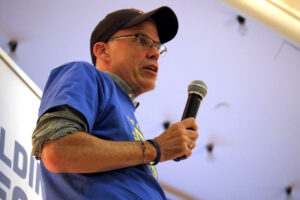 We knew it would, of course. He’s been writing about this since his 1989 breakout bestseller The End of Nature — inspired, as I recall, by his colleague Jonathan Schell’s The Fate of the Earth — and the influential Eaarth that came out, I think, in 2010. In the previous sections of The Flag, the Cross, and the Station Wagon he exposed how the lovely boyhood and middle class, churched upbringing contributed to a distorted understanding of our society and how thinks work in the world, but here – oh my. His reporting continues to shine; his prose riveting and his insight brilliant. The relationship of the flag and the cross are coming into focus and much of it is about, well, not exactly the station wagon, but the money accrued from the homes where those station wagons were parked. I know housing bubbles and interest rates and zoning battles may not seem like the sexiest topics for an entertaining nonfiction read, but trust me.
We knew it would, of course. He’s been writing about this since his 1989 breakout bestseller The End of Nature — inspired, as I recall, by his colleague Jonathan Schell’s The Fate of the Earth — and the influential Eaarth that came out, I think, in 2010. In the previous sections of The Flag, the Cross, and the Station Wagon he exposed how the lovely boyhood and middle class, churched upbringing contributed to a distorted understanding of our society and how thinks work in the world, but here – oh my. His reporting continues to shine; his prose riveting and his insight brilliant. The relationship of the flag and the cross are coming into focus and much of it is about, well, not exactly the station wagon, but the money accrued from the homes where those station wagons were parked. I know housing bubbles and interest rates and zoning battles may not seem like the sexiest topics for an entertaining nonfiction read, but trust me.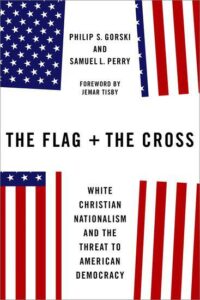 The Flag + The Cross: White Christian Nationalism and the Threat To American Democracy Philip S. Gorski & Samel L. Perry (Oxford University Press) $21.95 OUR SALE PRICE = $17.56
The Flag + The Cross: White Christian Nationalism and the Threat To American Democracy Philip S. Gorski & Samel L. Perry (Oxford University Press) $21.95 OUR SALE PRICE = $17.56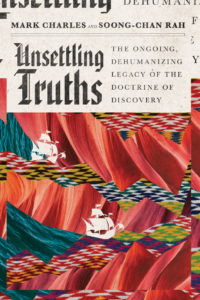 Unsettling Truths: The Ongoing, Dehumanizing Legacy of the Doctrine of Discovery Mark Charles and Soong-Chan Rah (IVP Academic) $20.00 OUR SALE PRICE = $16.00
Unsettling Truths: The Ongoing, Dehumanizing Legacy of the Doctrine of Discovery Mark Charles and Soong-Chan Rah (IVP Academic) $20.00 OUR SALE PRICE = $16.00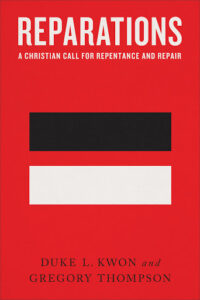 Reparations: A Christian Call for Repentance and Repair Duke L. Kwon & Gregory Thompson (Brazos Press) $24.99 OUR SALE PRICE = $19.99
Reparations: A Christian Call for Repentance and Repair Duke L. Kwon & Gregory Thompson (Brazos Press) $24.99 OUR SALE PRICE = $19.99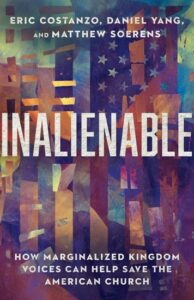 Inalienable: How Marginalized Kingdom Voices Can Help Save the American Church Eric Costanzo, Daniel Yang, and Matthew Soerens (IVP) $18.00 OUR SALE PRICE = $14.40
Inalienable: How Marginalized Kingdom Voices Can Help Save the American Church Eric Costanzo, Daniel Yang, and Matthew Soerens (IVP) $18.00 OUR SALE PRICE = $14.40 A Sort of Homecoming: Essays Honoring the Academic Work and Community Work of Brian Walsh edited by Marcia Boniferro, Amanda Jagt & Andrew Stephens-Rennie (Pickwick Publications) $34.00 OUR SALE PRICE = $27.20
A Sort of Homecoming: Essays Honoring the Academic Work and Community Work of Brian Walsh edited by Marcia Boniferro, Amanda Jagt & Andrew Stephens-Rennie (Pickwick Publications) $34.00 OUR SALE PRICE = $27.20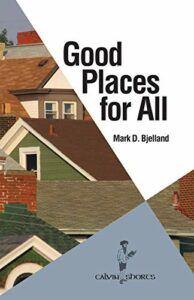 Mark D. Bjelland (Calvin College Press) $9.99 OUR SALE PRICE = $7.99
Mark D. Bjelland (Calvin College Press) $9.99 OUR SALE PRICE = $7.99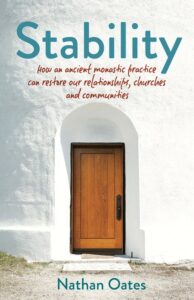 Stability: How an Ancient Monastic Practice Can Restore Our Relationships, Churches, and Communities Nathan Oates (Paraclete Press) $16.99 OUR SALE PRICE = $13.59
Stability: How an Ancient Monastic Practice Can Restore Our Relationships, Churches, and Communities Nathan Oates (Paraclete Press) $16.99 OUR SALE PRICE = $13.59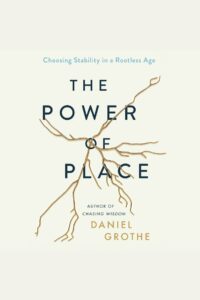 The Power of Place: Choosing Stability in a Rootless Age Daniel Grothe (Thomas Nelson) $25.99 OUR SALE PRICE = $20.79
The Power of Place: Choosing Stability in a Rootless Age Daniel Grothe (Thomas Nelson) $25.99 OUR SALE PRICE = $20.79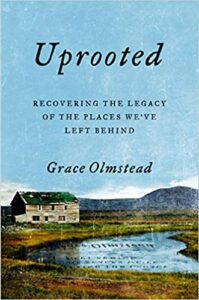 Uprooted: Recovering the Legacy of the Places We’ve Left Behind Grace Olmstead (Sentinel) $27.00 OUR SALE PRICE = $21.60
Uprooted: Recovering the Legacy of the Places We’ve Left Behind Grace Olmstead (Sentinel) $27.00 OUR SALE PRICE = $21.60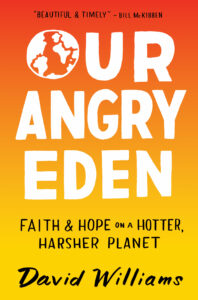 Our Angry Eden: Faith & Hope on a Hotter, Harsher Planet David Williams (Broadleaf Books) $26.99 OUR SALE PRICE = $21.59
Our Angry Eden: Faith & Hope on a Hotter, Harsher Planet David Williams (Broadleaf Books) $26.99 OUR SALE PRICE = $21.59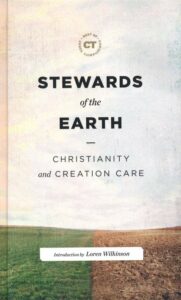 Stewards of the Earth: Christianity and Creation Care introduction by Lorin Wilkinson (Lexham Press) $22.99 OUR SALE PRICE = $18.38
Stewards of the Earth: Christianity and Creation Care introduction by Lorin Wilkinson (Lexham Press) $22.99 OUR SALE PRICE = $18.38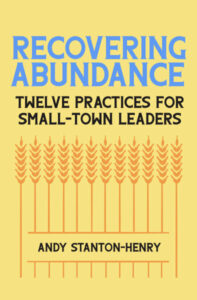 Recovering Abundance: Twelve Practices for Small-Town Leaders Andy Stanton-Henry (Fortress Press) $22.00 OUR SALE PRICE = $17.60
Recovering Abundance: Twelve Practices for Small-Town Leaders Andy Stanton-Henry (Fortress Press) $22.00 OUR SALE PRICE = $17.60 We’re glad folks enjoyed our big review of Charles Marsh’s stunning memoir Evangelical Anxiety that appeared in our previous BookNotes. The book is a fabulously written and entertaining rendering of his evolving faith as he copes with the repressive (and too often anti-world, anti-body) conservative evangelicalism of his Baptist youth, and, more interestingly, a story of his coming to terms with an anxiety disorder including panic attacks and the like. It’s a great read that will make you think.
We’re glad folks enjoyed our big review of Charles Marsh’s stunning memoir Evangelical Anxiety that appeared in our previous BookNotes. The book is a fabulously written and entertaining rendering of his evolving faith as he copes with the repressive (and too often anti-world, anti-body) conservative evangelicalism of his Baptist youth, and, more interestingly, a story of his coming to terms with an anxiety disorder including panic attacks and the like. It’s a great read that will make you think.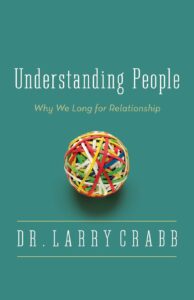 Understanding People: Why We Long for Relationships Larry Crabb (Zondervan) $16.99 OUR SALE PRICE = $13.59
Understanding People: Why We Long for Relationships Larry Crabb (Zondervan) $16.99 OUR SALE PRICE = $13.59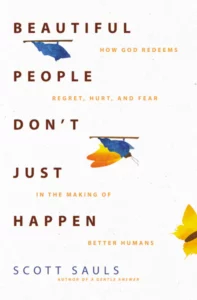 Beautiful People Don’t Just Happen: How God Redeems Regret, Hurt, and Fear in the Making of Better Humans Scott Sauls (Zondervan) $18.99 OUR SALE PRICE = $15.19
Beautiful People Don’t Just Happen: How God Redeems Regret, Hurt, and Fear in the Making of Better Humans Scott Sauls (Zondervan) $18.99 OUR SALE PRICE = $15.19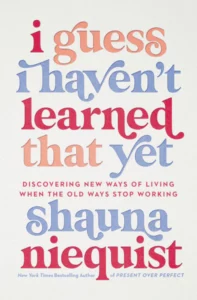 I Guess I Haven’t Learned That Yet: Discovering New Ways of Living When the Old Ways Stop Working Shauna Niequist (Zondervan) $26.00 OUR SALE PRICE = $20.80
I Guess I Haven’t Learned That Yet: Discovering New Ways of Living When the Old Ways Stop Working Shauna Niequist (Zondervan) $26.00 OUR SALE PRICE = $20.80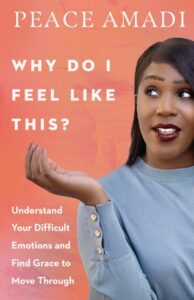 Why Do I Feel Like This?: Understand Your Difficult Emotions and Find Grace to Move Through Dr. Peace Amadi (IVP) $18.00 OUR SALE PRICE = $14.40
Why Do I Feel Like This?: Understand Your Difficult Emotions and Find Grace to Move Through Dr. Peace Amadi (IVP) $18.00 OUR SALE PRICE = $14.40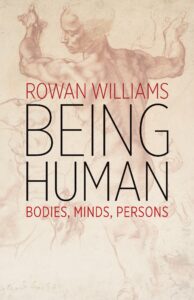 Being Human: Bodies, Minds, Persons Rowan Williams (Eerdmans) $12.00 OUR SALE PRICE = $9.60
Being Human: Bodies, Minds, Persons Rowan Williams (Eerdmans) $12.00 OUR SALE PRICE = $9.60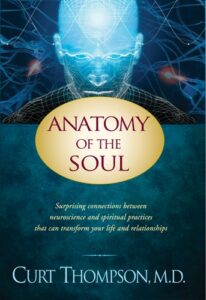 Anatomy of the Soul: Surprising Connections Between Neuroscience and Spiritual Practices Curt Thompson (Tyndale) $17.99 OUR SALE PRICE = $14.39
Anatomy of the Soul: Surprising Connections Between Neuroscience and Spiritual Practices Curt Thompson (Tyndale) $17.99 OUR SALE PRICE = $14.39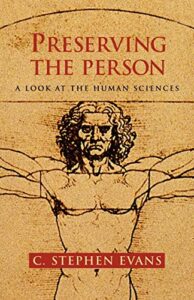 Preserving the Person: A Look at the Human Sciences C. Stephen Evans (Regent College Press) $19.95 OUR SALE PRICE = $15.96
Preserving the Person: A Look at the Human Sciences C. Stephen Evans (Regent College Press) $19.95 OUR SALE PRICE = $15.96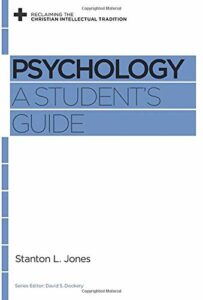 Psychology: A Student’s Guide Stanton K. Jones (Crossway) $11.99 OUR SALE PRICE = $9.59
Psychology: A Student’s Guide Stanton K. Jones (Crossway) $11.99 OUR SALE PRICE = $9.59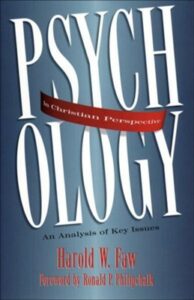 Psychology in Christian Perspective: An Analysis of Key Issues Harold W. Faw (Baker Academic) $22.00 OUR SALE PRICE = $17.60
Psychology in Christian Perspective: An Analysis of Key Issues Harold W. Faw (Baker Academic) $22.00 OUR SALE PRICE = $17.60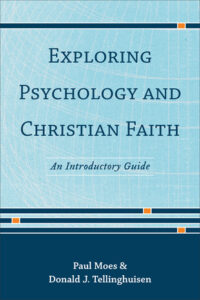 Exploring Psychology and Christian Faith: An Introductory Guide Paul Moesv & Donald J. Tellinghuisen (Baker Academic) $30.00 OUR SALE PRICE = $24.00
Exploring Psychology and Christian Faith: An Introductory Guide Paul Moesv & Donald J. Tellinghuisen (Baker Academic) $30.00 OUR SALE PRICE = $24.00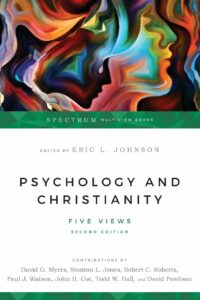 Psychology and Christianity: Five Views edited by Eric L. Johnson (IVP) $30.00 OUR SALE PRICE = $24.00
Psychology and Christianity: Five Views edited by Eric L. Johnson (IVP) $30.00 OUR SALE PRICE = $24.00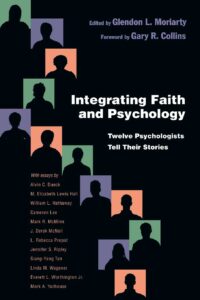 edited by Glendon Moriarty (IVP) $27.00 OUR SALE PRICE = $21.60
edited by Glendon Moriarty (IVP) $27.00 OUR SALE PRICE = $21.60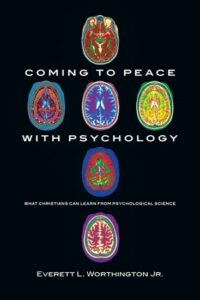 Coming to Peace with Psychology: What Christians Can Learn from Psychological Science Everett L.Worthington Jr. (IVP Academic) $30.00 OUR SALE PRICE = $24.00
Coming to Peace with Psychology: What Christians Can Learn from Psychological Science Everett L.Worthington Jr. (IVP Academic) $30.00 OUR SALE PRICE = $24.00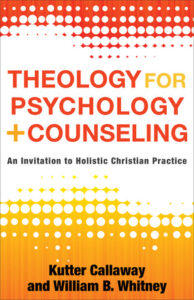 Theology for Psychology and Counseling: An Invitation to Holistic Christian Practice Kutter Callaway & William Whitney (Baker Academic) $21.99 OUR SALE PRICE = $17.59
Theology for Psychology and Counseling: An Invitation to Holistic Christian Practice Kutter Callaway & William Whitney (Baker Academic) $21.99 OUR SALE PRICE = $17.59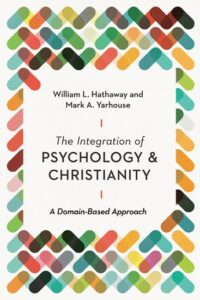 The Integration of Psychology and Christianity: A Domain-Based Approach William L. Hathaway & Mark Yarhouse (IVP Academic) $28.00 OUR SALE PRICE = $22.40
The Integration of Psychology and Christianity: A Domain-Based Approach William L. Hathaway & Mark Yarhouse (IVP Academic) $28.00 OUR SALE PRICE = $22.40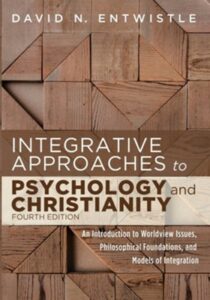 Integrative Approaches to Psychology and Christianity, Fourth Edition: An Introduction to Worldview Issues, Philosophical Foundations, and Models of Integration David Entwistle (Cascade Books) $48.00 OUR SALE PRICE = $38.40
Integrative Approaches to Psychology and Christianity, Fourth Edition: An Introduction to Worldview Issues, Philosophical Foundations, and Models of Integration David Entwistle (Cascade Books) $48.00 OUR SALE PRICE = $38.40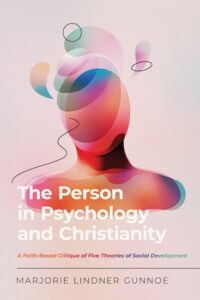 The Person in Psychology and Christianity: A Faith-Based Critique of Five Theories of Social Development Majorie Lindner Guano (IVP Academic) $30.00 OUR SALE PRICE = $24.00
The Person in Psychology and Christianity: A Faith-Based Critique of Five Theories of Social Development Majorie Lindner Guano (IVP Academic) $30.00 OUR SALE PRICE = $24.00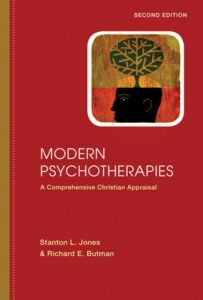 Modern Psychotherapies: A Comprehensive Christian Appraisal
Modern Psychotherapies: A Comprehensive Christian Appraisal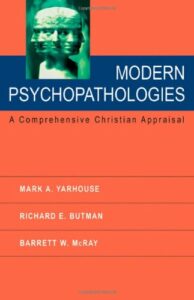 Modern Psychopathologies: A Comprehensive Christian Appraisal Mark Yarhouse, Richard Butman & Barrett McRay (IVP Academic) $60.00 OUR SALE PRICE = $48.00
Modern Psychopathologies: A Comprehensive Christian Appraisal Mark Yarhouse, Richard Butman & Barrett McRay (IVP Academic) $60.00 OUR SALE PRICE = $48.00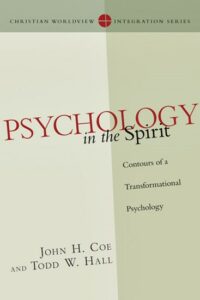 Psychology in the Spirit: Contours of a Transformational Psychology John H.Coe & Todd W. Hall (IVP Academic) $38.00 OUR SALE PRICE = $30.40
Psychology in the Spirit: Contours of a Transformational Psychology John H.Coe & Todd W. Hall (IVP Academic) $38.00 OUR SALE PRICE = $30.40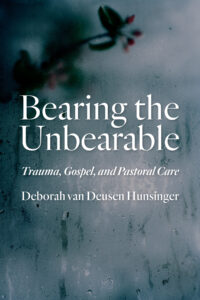 Bearing the Unbearable: Trauma, Gospel, and Pastoral Care Deborah van Deusen Hunsinger (Eerdmans) $20.00 OUR SALE PRICE = $16.00
Bearing the Unbearable: Trauma, Gospel, and Pastoral Care Deborah van Deusen Hunsinger (Eerdmans) $20.00 OUR SALE PRICE = $16.00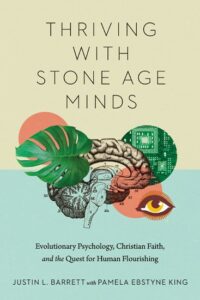 Thriving with Stone Age Minds: Evolutionary Psychology, Christian Faith, and the Quest for Human Flourishing
Thriving with Stone Age Minds: Evolutionary Psychology, Christian Faith, and the Quest for Human Flourishing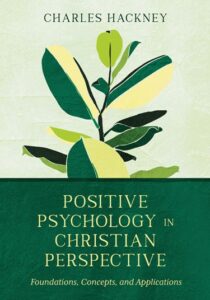 Positive Psychology in Christian Perspective: Foundations, Concepts, and Applications Charles Hackney (IVP Academic) $45.00 OUR SALE PRICE = $36.00
Positive Psychology in Christian Perspective: Foundations, Concepts, and Applications Charles Hackney (IVP Academic) $45.00 OUR SALE PRICE = $36.00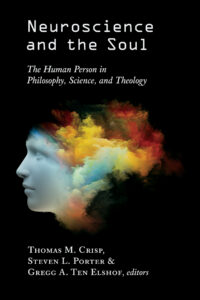 Neuroscience and the Soul: The Human Person in Philosophy, Science, and Theology edited by Thomas M. Crisp, Steven Porter, Gregg A. Ten Elshof
Neuroscience and the Soul: The Human Person in Philosophy, Science, and Theology edited by Thomas M. Crisp, Steven Porter, Gregg A. Ten Elshof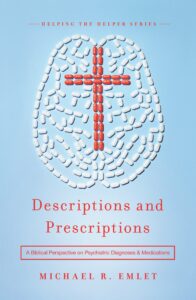 Descriptions and Prescriptions: A Biblical Perspective on Psychiatric Diagnoses & Medications Michael Emlet (New Growth Press) $15.99 OUR SALE PRICE = $12.79
Descriptions and Prescriptions: A Biblical Perspective on Psychiatric Diagnoses & Medications Michael Emlet (New Growth Press) $15.99 OUR SALE PRICE = $12.79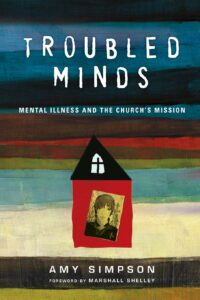 Troubled Minds: Mental Illness and the Church’s Mission Amy Simpson (IVP) $20.00 OUR SALE PRICE = $16.00
Troubled Minds: Mental Illness and the Church’s Mission Amy Simpson (IVP) $20.00 OUR SALE PRICE = $16.00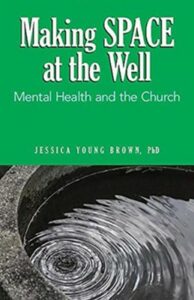 Making SPACE at the Well: Mental Health and the Church Jessica Young Brown (Judson Press) $16.99 OUR SALE PRICE = $13.59
Making SPACE at the Well: Mental Health and the Church Jessica Young Brown (Judson Press) $16.99 OUR SALE PRICE = $13.59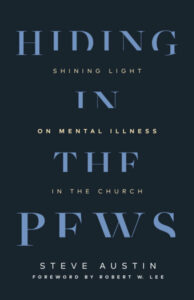 Hiding in the Pews: Shining Light on Mental Illness in the Church Steve Austin (Fortress Press) $23.00 OUR SALE PRICE = $18.40
Hiding in the Pews: Shining Light on Mental Illness in the Church Steve Austin (Fortress Press) $23.00 OUR SALE PRICE = $18.40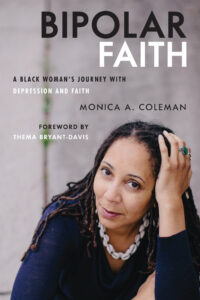 Bipolar Faith: A Black Woman’s Journey with Depression and Faith Monica Coleman (Fortress) $19.99 OUR SALE PRICE = $15.99
Bipolar Faith: A Black Woman’s Journey with Depression and Faith Monica Coleman (Fortress) $19.99 OUR SALE PRICE = $15.99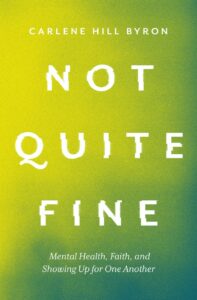 Not Quite Fine: Mental Health, Faith, and Showing Up for One Another Carlene Hill Byron (Herald Press) $16.99 OUR SALE PRICE = $13.59
Not Quite Fine: Mental Health, Faith, and Showing Up for One Another Carlene Hill Byron (Herald Press) $16.99 OUR SALE PRICE = $13.59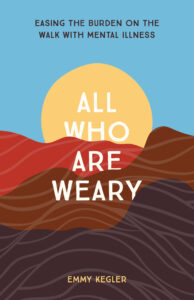 All Who Are Weary: Easing the Burden on the Walk with Mental Illness Emmy Kegler (Broadleaf Books) $18.99 OUR SALE PRICE = $15.19
All Who Are Weary: Easing the Burden on the Walk with Mental Illness Emmy Kegler (Broadleaf Books) $18.99 OUR SALE PRICE = $15.19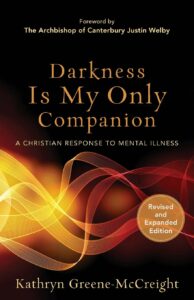 Darkness Is My Only Companion: A Christian Response to Mental Illness Kathryn Greene-McCreight (Brazos Press) $21.99 OUR SALE PRICE = $17.59
Darkness Is My Only Companion: A Christian Response to Mental Illness Kathryn Greene-McCreight (Brazos Press) $21.99 OUR SALE PRICE = $17.59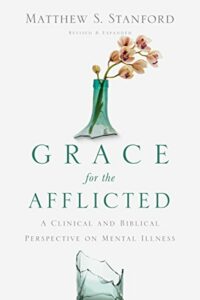 Grace for the Afflicted: A Clinical and Biblical Perspective on Mental Illness Matthew Stanford (IVP) $25.00 OUR SALE PRICE = $20.00
Grace for the Afflicted: A Clinical and Biblical Perspective on Mental Illness Matthew Stanford (IVP) $25.00 OUR SALE PRICE = $20.00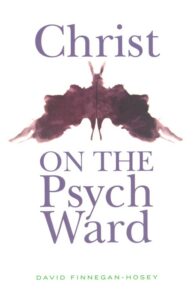 Christ on the Psych Ward David Finnegan-Hosey (Church Publishing) $17.95 OUR SALE PRICE = $14.36
Christ on the Psych Ward David Finnegan-Hosey (Church Publishing) $17.95 OUR SALE PRICE = $14.36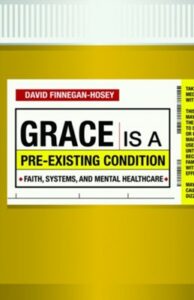 Grace Is a Pre-Existing Condition: Faith, Systems, and Mental Healthcare David Finnegan-Hosey (Church Publishing) $18.95 OUR SALE PRICE = $15.16
Grace Is a Pre-Existing Condition: Faith, Systems, and Mental Healthcare David Finnegan-Hosey (Church Publishing) $18.95 OUR SALE PRICE = $15.16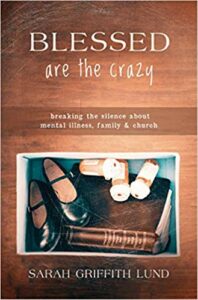 Blessed are the Crazy: Breaking Silence About Mental Illness, Family and Church Sarah Griffith Lund (Chalice Press) $ 17.99 OUR SALE PRICE = $14.39
Blessed are the Crazy: Breaking Silence About Mental Illness, Family and Church Sarah Griffith Lund (Chalice Press) $ 17.99 OUR SALE PRICE = $14.39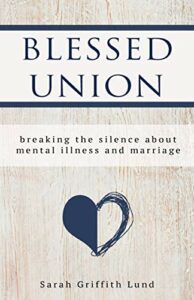 Blessed Union: Breaking the Silence About Mental Illness and Marriage Sarah Griffith Lund (Chalice Press) $15.99 OUR SALE PRICE = $12.79
Blessed Union: Breaking the Silence About Mental Illness and Marriage Sarah Griffith Lund (Chalice Press) $15.99 OUR SALE PRICE = $12.79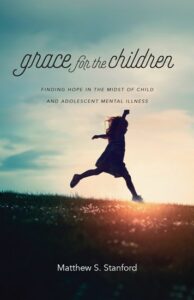 Grace for the Children: Finding Hope in the Midst of Child and Adolescent Mental Illness
Grace for the Children: Finding Hope in the Midst of Child and Adolescent Mental Illness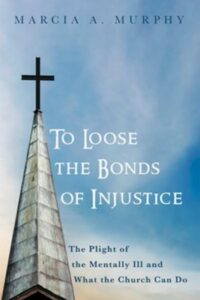 To Loose the Bonds of Injustice: The Plight the Mentally Ill and What the Church Can Do Marcia A. Murphy (Resource Publications) $20.00 OUR SALE PRICE = $16.00
To Loose the Bonds of Injustice: The Plight the Mentally Ill and What the Church Can Do Marcia A. Murphy (Resource Publications) $20.00 OUR SALE PRICE = $16.00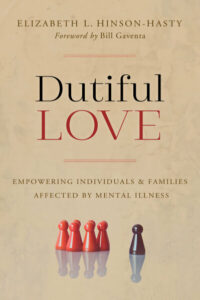 Dutiful Love: Empowering Individuals & Families Affected by Mental Illness Elizabeth L.Hinson-Hasty (Fortress) $24.00 OUR SALE PRICE = $19.20
Dutiful Love: Empowering Individuals & Families Affected by Mental Illness Elizabeth L.Hinson-Hasty (Fortress) $24.00 OUR SALE PRICE = $19.20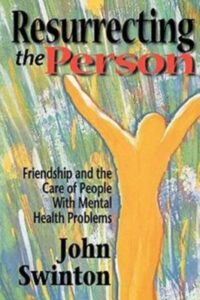 Resurrecting the Person: Friendship and the Care of People with Mental Health Problems John Swinton (Abingdon Press) $25.99 OUR SALE PRICE = $20.79
Resurrecting the Person: Friendship and the Care of People with Mental Health Problems John Swinton (Abingdon Press) $25.99 OUR SALE PRICE = $20.79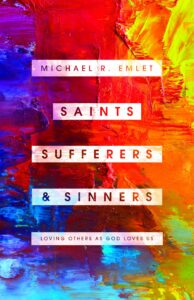 Saints, Sufferers & Sinners: Loving Others as God Loves Us Michael Emlet (New Growth Press) $17.99 OUR SALE PRICE = $14.39
Saints, Sufferers & Sinners: Loving Others as God Loves Us Michael Emlet (New Growth Press) $17.99 OUR SALE PRICE = $14.39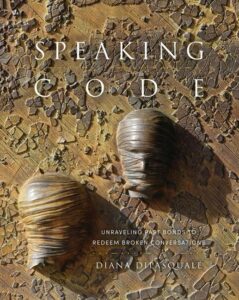 Speaking Code: Unraveling Past Bonds to Redeem Broken Conversations Diana DiPasquale (Square Halo Books) $33.99 OUR SALE PRICE = $27.19
Speaking Code: Unraveling Past Bonds to Redeem Broken Conversations Diana DiPasquale (Square Halo Books) $33.99 OUR SALE PRICE = $27.19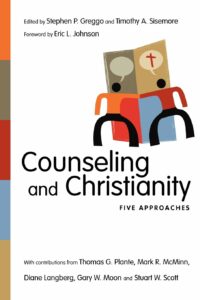 Counseling and Christianity: Five Approaches edited by Stephen Greg & Timothy Sisemore (IVP Academic) $28.00 OUR SALE PRICE = $22.40
Counseling and Christianity: Five Approaches edited by Stephen Greg & Timothy Sisemore (IVP Academic) $28.00 OUR SALE PRICE = $22.40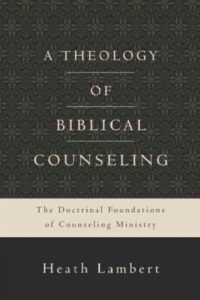 A Theology of Biblical Counseling: The Doctrinal Foundations of Counseling Ministry Heath Lambert (Zondervan) $27.99 OUR SALE PRICE = $22.39
A Theology of Biblical Counseling: The Doctrinal Foundations of Counseling Ministry Heath Lambert (Zondervan) $27.99 OUR SALE PRICE = $22.39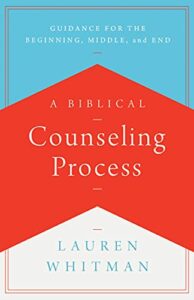 A Biblical Counseling Process: Guidance for the Beginning, Middle, and End Lauren Whitman (New Growth Press) $15.99 OUR SALE PRICE = $12.79
A Biblical Counseling Process: Guidance for the Beginning, Middle, and End Lauren Whitman (New Growth Press) $15.99 OUR SALE PRICE = $12.79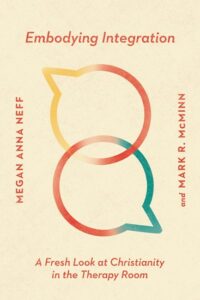 Embodying Integration: A Fresh Look at Christianity in the Therapy Room Began Anna Neff & Mark McMinn (IVP Academic) $28.00 OUR SALE PRICE = $22.40
Embodying Integration: A Fresh Look at Christianity in the Therapy Room Began Anna Neff & Mark McMinn (IVP Academic) $28.00 OUR SALE PRICE = $22.40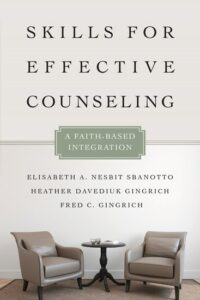 Skills for Effective Counseling: A Faith-Based Integration Elisabeth A. Nesbit Sbanotto, Heather Davediuk Gingrich, and Fred C. Gingrich (IVP Academic) $50.00 OUR SALE PRICE = $40.00
Skills for Effective Counseling: A Faith-Based Integration Elisabeth A. Nesbit Sbanotto, Heather Davediuk Gingrich, and Fred C. Gingrich (IVP Academic) $50.00 OUR SALE PRICE = $40.00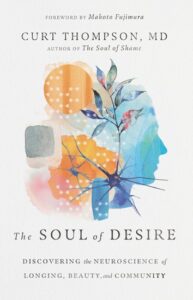 The Soul of Desire: Discovering the Neuroscience of Longing, Beauty, and Community. Curt Thompson (IVP) $27.00 OUR SALE PRICE = $21.60
The Soul of Desire: Discovering the Neuroscience of Longing, Beauty, and Community. Curt Thompson (IVP) $27.00 OUR SALE PRICE = $21.60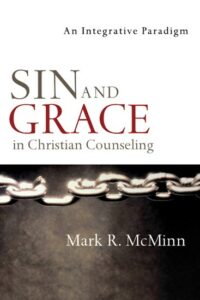 Sin and Grace in Christian Counseling: An Integrative Paradigm Mark McMinn (IVP Academic)
Sin and Grace in Christian Counseling: An Integrative Paradigm Mark McMinn (IVP Academic)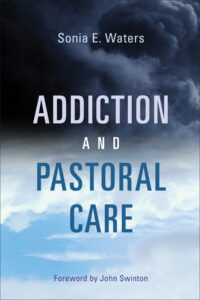 Addiction and Pastoral Care Sonia Waters (Eerdmans) $26.50 OUR SALE PRICE = $21.20
Addiction and Pastoral Care Sonia Waters (Eerdmans) $26.50 OUR SALE PRICE = $21.20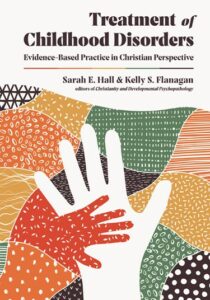 Treatment of Childhood Disorders: Evidence-Based Practice in Christian Perspective Sarah E. Hall and Kelly S. Flanagam (IVP Academic) $55.00 OUR SALE PRICE = $44.00
Treatment of Childhood Disorders: Evidence-Based Practice in Christian Perspective Sarah E. Hall and Kelly S. Flanagam (IVP Academic) $55.00 OUR SALE PRICE = $44.00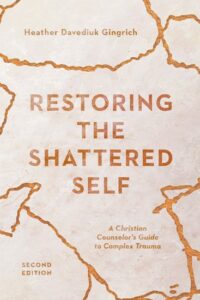 Restoring the Shattered Shelf: A Christian Counselor’s Guide to Complex Trauma (2nd edition) Heather Davediuk Gingrich (IVP Academic) $32.00 OUR SALE PRICE = $25.60
Restoring the Shattered Shelf: A Christian Counselor’s Guide to Complex Trauma (2nd edition) Heather Davediuk Gingrich (IVP Academic) $32.00 OUR SALE PRICE = $25.60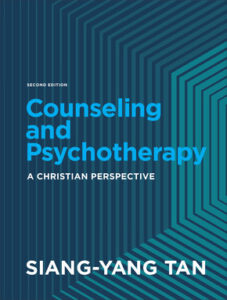 Counseling and Psychotherapy: A Christian Perspective (2nd edition) Siang-Yang Tan (Baker Academic) $49.99 OUR SALE PRICE = $39.99
Counseling and Psychotherapy: A Christian Perspective (2nd edition) Siang-Yang Tan (Baker Academic) $49.99 OUR SALE PRICE = $39.99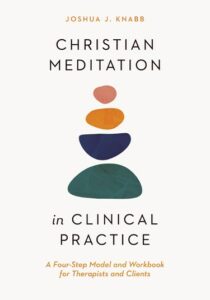 Christian Meditation in Clinical Practice: A Four Step Model and Workbook for Therapist and Clients Joshua Knabb (IVP) $40.00 OUR SALE PRICE = $32.00
Christian Meditation in Clinical Practice: A Four Step Model and Workbook for Therapist and Clients Joshua Knabb (IVP) $40.00 OUR SALE PRICE = $32.00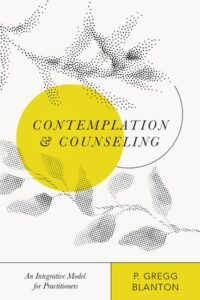 Contemplation & Counseling: An Integrated Model for Practitioners
Contemplation & Counseling: An Integrated Model for Practitioners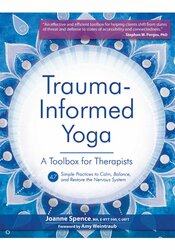 47 Practices to Calm, Balance, and Restore the Nervous System Joanne Spence (PESI Publishing) $29.99 OUR SALE PRICE = $23.99
47 Practices to Calm, Balance, and Restore the Nervous System Joanne Spence (PESI Publishing) $29.99 OUR SALE PRICE = $23.99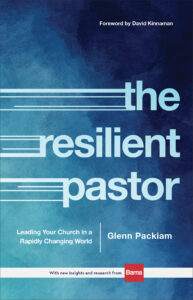 the powerhouse stories in Stuck: Why Clergy Are Alienated from Their Calling, Congregation, and Career by sociologists, one a former pastor himself, Todd Ferguson & Josh Packer. Not all were for those who are drained by their call to minister these days; I so appreciated Tom Nelson’s The Flourishing Pastor and can’t recommend it enough. Every pastor I know would love the fabulous The Pastor’s Bookshelf which offers pretty exquisite writing about the value of the reading life and the different ways reading widely and deeply can inspire and equip pastors in their important work. That reminded me of a post we did a month ago on the significance of reading thoughtfully and well
the powerhouse stories in Stuck: Why Clergy Are Alienated from Their Calling, Congregation, and Career by sociologists, one a former pastor himself, Todd Ferguson & Josh Packer. Not all were for those who are drained by their call to minister these days; I so appreciated Tom Nelson’s The Flourishing Pastor and can’t recommend it enough. Every pastor I know would love the fabulous The Pastor’s Bookshelf which offers pretty exquisite writing about the value of the reading life and the different ways reading widely and deeply can inspire and equip pastors in their important work. That reminded me of a post we did a month ago on the significance of reading thoughtfully and well 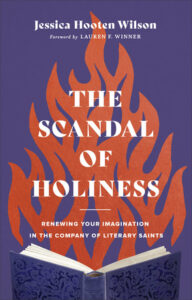 which included amazing books like The Scandal of Holiness: Renewing Your Imagination in the Company of Literary Saints by Jessica Wilson Hooten and Imagining Our Neighbors as Ourselves: How Art Shapes Empathy by Mary McCampbell and Reading Black Books: How African American Literature Can Make Our Faith More Whole and Just by the very lively, righteous Rev. Claude Atcho. It’s been a good season, eh? Those of us who are book lovers and love reading about our favorite pastime will be grateful for these wise reads.
which included amazing books like The Scandal of Holiness: Renewing Your Imagination in the Company of Literary Saints by Jessica Wilson Hooten and Imagining Our Neighbors as Ourselves: How Art Shapes Empathy by Mary McCampbell and Reading Black Books: How African American Literature Can Make Our Faith More Whole and Just by the very lively, righteous Rev. Claude Atcho. It’s been a good season, eh? Those of us who are book lovers and love reading about our favorite pastime will be grateful for these wise reads. There is also great tenderness in Evangelical Anxiety. Marsh writes about taking his kids to a Christian camp. He describes his love for his mother, including the solace she offered during his fearful nights as a boy. He is deeply remorseful when he has hurt his wife. He struggles with how to relate his own scholarship – he writes about Bonhoeffer, after all – with his own practice of lived discipleship. He holds what he knows to be true about the world, its racism and violence, and is learning how to carry on as a sane and happy person. In a simple passage about finding joy in good things in God’s creation, the spirituality of the ordinary, so to speak, he mentions how his friend, the evangelical, black leader John Perkins likes blue berries. I got a lump in my throat, just such a lovely little line about a man who has suffered much and experienced great fame, Charles’s friend. Many who pick up this book and enter this story will also be struck by Marsh’s great love for literature and the often beautiful way he mentions novels and authors, his intimate relationship with their truths and artful pleasures. I so enjoyed reading about a man I respect and the books he loves and the authors who have informed him.
There is also great tenderness in Evangelical Anxiety. Marsh writes about taking his kids to a Christian camp. He describes his love for his mother, including the solace she offered during his fearful nights as a boy. He is deeply remorseful when he has hurt his wife. He struggles with how to relate his own scholarship – he writes about Bonhoeffer, after all – with his own practice of lived discipleship. He holds what he knows to be true about the world, its racism and violence, and is learning how to carry on as a sane and happy person. In a simple passage about finding joy in good things in God’s creation, the spirituality of the ordinary, so to speak, he mentions how his friend, the evangelical, black leader John Perkins likes blue berries. I got a lump in my throat, just such a lovely little line about a man who has suffered much and experienced great fame, Charles’s friend. Many who pick up this book and enter this story will also be struck by Marsh’s great love for literature and the often beautiful way he mentions novels and authors, his intimate relationship with their truths and artful pleasures. I so enjoyed reading about a man I respect and the books he loves and the authors who have informed him.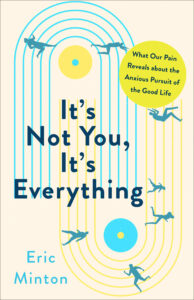 It’s Not You It’s Everything: What Our Pain Reveals About the Anxious Pursuit of the Good Life Eric Minton (Broadleaf Books) $24.99 OUR SALE PRICE = $19.99
It’s Not You It’s Everything: What Our Pain Reveals About the Anxious Pursuit of the Good Life Eric Minton (Broadleaf Books) $24.99 OUR SALE PRICE = $19.99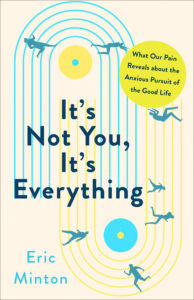 And so, this is one provocative, incisive, wide-angled and yet somehow intimately soothing, self-help book. It’s not all big picture lament; he draws nicely on Brene Brown and Glennon Doyle and the fabulous David Dark (especially his Life’s Too Short to Pretend You’re Not Religious.) He quotes artists and shows from pop culture (including a funny story about MC Hammer in the acknowledgments, which certainly dates his coming of age.) He has a few Cracker Barrel mentions and there’s that lovely story about the luminous night with fireflies. He obviously has Mr. Rogers at the ready, all right alongside Cornel West and James Baldwin.
And so, this is one provocative, incisive, wide-angled and yet somehow intimately soothing, self-help book. It’s not all big picture lament; he draws nicely on Brene Brown and Glennon Doyle and the fabulous David Dark (especially his Life’s Too Short to Pretend You’re Not Religious.) He quotes artists and shows from pop culture (including a funny story about MC Hammer in the acknowledgments, which certainly dates his coming of age.) He has a few Cracker Barrel mentions and there’s that lovely story about the luminous night with fireflies. He obviously has Mr. Rogers at the ready, all right alongside Cornel West and James Baldwin.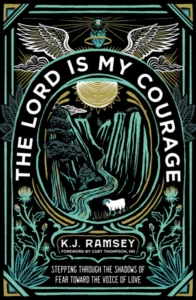 The Lord is My Courage: Stepping Through the Shadows of Fear Toward the Voice of Light K.J. Ramsey (Zondervan) $22.99 OUR SALE PRICE = $18.39 RELEASING JUNE 14, 2020
The Lord is My Courage: Stepping Through the Shadows of Fear Toward the Voice of Light K.J. Ramsey (Zondervan) $22.99 OUR SALE PRICE = $18.39 RELEASING JUNE 14, 2020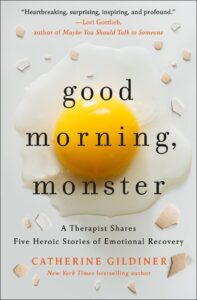 Good Morning Monster: A Therapist Shares Five Heroic Stories of Emotional Recovery Catherine Gildiner (St. Martin’s Press) $27.99 OUR SALE PRICE = $22.39
Good Morning Monster: A Therapist Shares Five Heroic Stories of Emotional Recovery Catherine Gildiner (St. Martin’s Press) $27.99 OUR SALE PRICE = $22.39 The Emotional Life of Our Lord B.B Warfield (Crossway) $8.99 OUR SALE PRICE = $7.19
The Emotional Life of Our Lord B.B Warfield (Crossway) $8.99 OUR SALE PRICE = $7.19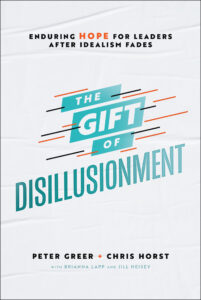 The Gift of Disillusionment : Enduring Hope for Leaders After Idealism Fades Peter Greer & Chris Horst (Bethany House) $22.99
The Gift of Disillusionment : Enduring Hope for Leaders After Idealism Fades Peter Greer & Chris Horst (Bethany House) $22.99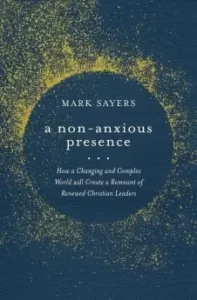 A Non-Anxious Presence: How a Changing and Complex World Will Create a Remnant Renewed Christian Leaders Mark Sayers (Moody Press) $15.99
A Non-Anxious Presence: How a Changing and Complex World Will Create a Remnant Renewed Christian Leaders Mark Sayers (Moody Press) $15.99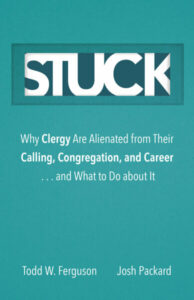 Stuck: Why Clergy Are Alienated from Their Calling, Congregation, and Career… and What to Do About It Todd W. Ferguson & Josh Packard (Fortress Press) $22.99
Stuck: Why Clergy Are Alienated from Their Calling, Congregation, and Career… and What to Do About It Todd W. Ferguson & Josh Packard (Fortress Press) $22.99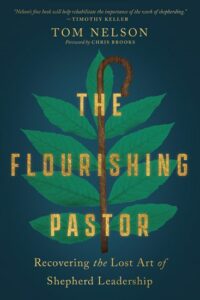 The Flourishing Pastor: Recovering the Lost Art of Shepherd Leadership
The Flourishing Pastor: Recovering the Lost Art of Shepherd Leadership 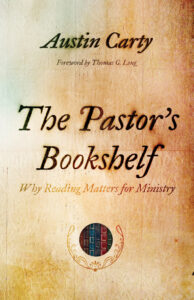 The Pastor’s Bookshelf: Why Reading Matters for Ministry
The Pastor’s Bookshelf: Why Reading Matters for Ministry 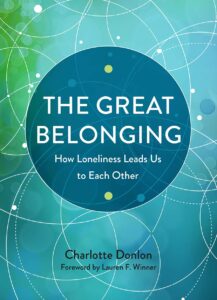 The Great Belonging: How Loneliness Leads Us To Each Other Charlotte Donlon (Broadleaf Books) $16.99
The Great Belonging: How Loneliness Leads Us To Each Other Charlotte Donlon (Broadleaf Books) $16.99